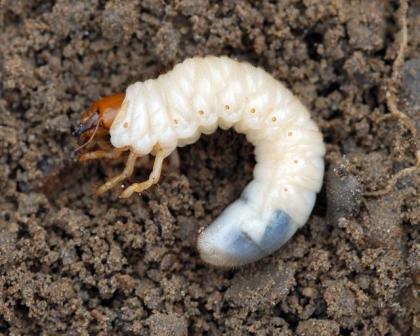Grubs, the larval stage of the beetle, are common lawn pests. They are off-white with a light brown head. Three pairs of legs are near the head of the grub January 2 inches (3 3/4 inches).
Most beetles have a life cycle three years causing most damage in the second year. In June, the adult lays eggs in the soil. Within two weeks, the grubs emerge. They feed during the hot summer months and during the winter deep in the ground. Early in the following summer, the larvae move near the soil surface and begin feeding again. They can cause significant damage in small numbers because of their voracious appetite. After a short feeding period during the third summer, the white grub pupates and turns into an adult. The adult (beetle June) overwinter in the soil and lay eggs, the following summer, completing its life cycle.
Grubs feed on grass, grass roots, and farm and garden crops. They feed on potato tubers, but prefer the fibrous roots of grass. The adult stage also feeds on flowers. Feeding white headless results in dead patches of grass that yellow and pull back as the freshly laid sod or thinning areas scattered grass dying for no apparent reason.
A healthy lawn is the best protection against white grubs. A watered well fertilized, aerated lawn provides resistance against the white grub attack. Good root growth is helpful for adults prefer to lay eggs in the fine grass.
Even with the best cultural practices, sometimes it becomes necessary to directly address this annual problem. AgriLawn two treatments that will help you eliminate and prevent this annoying problem damaging the turf.
Treatment Grub
If you have had this lock problems, it is important to eliminate the worms that live in your grass layer. For this treatment to be effective, ground temperatures must be high enough for the larvae come to the top layer of soil to nourish usually between April and November each year. This treatment is the same cost as your lawn program and can be added if you or your technician notice the signs of damage. We do not treat existing problems without your permission, you'll need to call us if you want to plan treatment.
Preventive grub
If you have had treatment headless in the past and you just want to prevent further infestation and preventive grub is in order. A preventive, unlike treatment prevents worm molting its phase pupate. The eggs that may be in the ground will not hatch and thus prevents the infestation of these insects destroy the lawn from becoming a problem. Timing is critical and this request must be made in June, which is the height of spawning activity.
White grubs
![White grubs]() Reviewed by the moon
on
8:22 AM
Rating:
Reviewed by the moon
on
8:22 AM
Rating:



No comments: